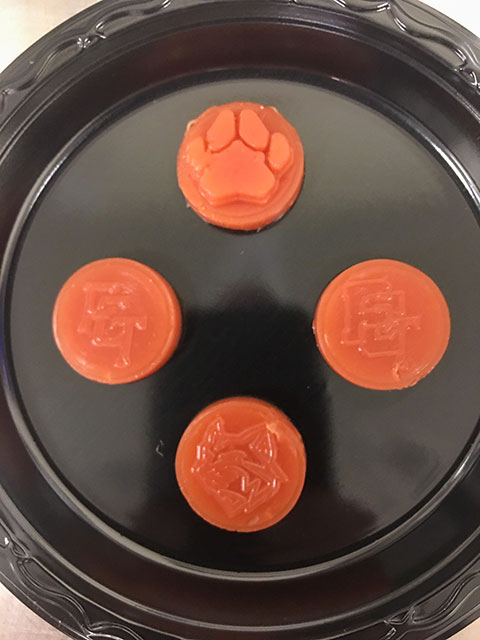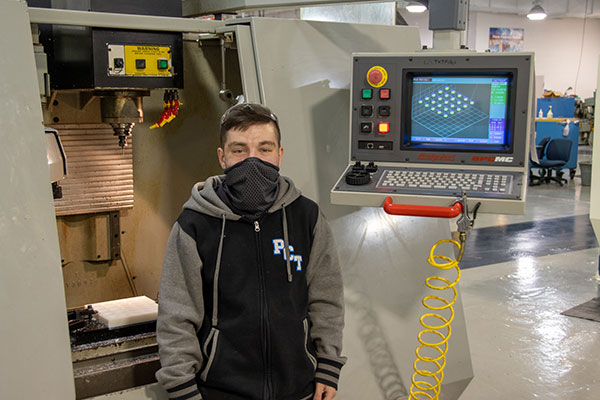In two very different Pennsylvania College of Technology labs, students share a similar focus. Both are using science, technology and the skills they’ve honed to develop new ways to practice their crafts.
In Chef Frank Suchwala’s Introduction to the Modernist Kitchen course, culinary arts students add science and technology to tried-and-true techniques to create new ways of presenting food. In Spring 2021, they added new tools made in a lab two buildings away.
 The tools – a set of food/candy molds made of food-grade nylon and a metallic mold for making fresh cheese – were designed and produced in the Automated Manufacturing Lab inside the College Avenue Labs building.
The tools – a set of food/candy molds made of food-grade nylon and a metallic mold for making fresh cheese – were designed and produced in the Automated Manufacturing Lab inside the College Avenue Labs building.
The food/candy molds were the senior project of manufacturing engineering technology student Mark T. McCorkle, of Natrona Heights.
The proposal to manufacture a candy mold was originally submitted in Fall 2019 by a student whose family members made candies. His design included custom logos.
“We started from the artist concept, made drawings, and eventually CNC code files to machine the part,” explained John M. Good III, instructor of automation and computer integrated manufacturing. “I ordered food-grade nylon from a local distributor who gave us 8-by-8-by-1-inch blanks. We went home for Spring Break and (because of COVID-19), and never came back. Some projects could not be completed due to restrictions, so the project ended.”
Since the college already had the material, Good sought a student in the 2020-21 Senior Seminar to continue the project as their capstone. McCorkle agreed to take it on, using Penn College logos instead and making them to Suchwala’s specifications. He used software to model the new molds, selected tooling and produced prototypes for Suchwala using a CNC mill vertical machining center. Instead of using coolant – which would not be food-safe – in the milling process, he ran a stream of compressed air to remove nylon shavings as the machine worked.
After reviewing his first prototype with Suchwala, McCorkle refined the design and tooling, including incorporating a tapered end mill to cut the edge of the mold on an angle to allow food to release from the mold more easily.
In addition to the “pockets,” or “cups” for the candy/food molds, McCorkle developed code for the machining center to add an image within each mold: one program for the Wildcat head athletics logo, one for a “PCT” image, and one for the college’s Wildcat paw mark.
“It required designing some crazy tooth paths,” said McCorkle, who plans to graduate in December. “It was interesting trying to machine plastic.”
 On his first visit to Penn College, McCorkle was unsure what he wanted to do, until he visited the Automated Manufacturing Lab.
On his first visit to Penn College, McCorkle was unsure what he wanted to do, until he visited the Automated Manufacturing Lab.
“If you can think it, you can create it in here,” McCorkle said.
Suchwala and his students – who, similarly, are developing the techniques to bring their culinary ideas to life – tested McCorkle’s food/candy molds on April 19, practicing the gelation process on a tomato gel. They replaced the traditional gelling agent, gelatin, with agar-agar.
“When food gels are formed using agar-agar as the gelling agent, the food is thermally reversible back to a liquid at between 185 and 205 degrees Fahrenheit,” Suchwala explained. “So using different shapes and designs, you can incorporate some shapes directly into a consommé or broth to add texture and additional flavors. They sky is the limit. Imagine a tomato soup with basil gels incorporated in the shapes of cherry tomato halves. Those gels can have very intense flavors that you normally wouldn’t achieve. It’s an older technique with a modern application.”
An application combining science, technology and hands-on ingenuity inspired by a Penn College education.
To learn more about culinary arts majors at Penn College, call 570-327-4505. For more about automated manufacturing and machining majors, call 570-327-4520.
For information about Penn College, a national leader in applied technology education, email the Admissions Office or call toll-free 800-367-9222.
In Chef Frank Suchwala’s Introduction to the Modernist Kitchen course, culinary arts students add science and technology to tried-and-true techniques to create new ways of presenting food. In Spring 2021, they added new tools made in a lab two buildings away.
 The tools – a set of food/candy molds made of food-grade nylon and a metallic mold for making fresh cheese – were designed and produced in the Automated Manufacturing Lab inside the College Avenue Labs building.
The tools – a set of food/candy molds made of food-grade nylon and a metallic mold for making fresh cheese – were designed and produced in the Automated Manufacturing Lab inside the College Avenue Labs building.The food/candy molds were the senior project of manufacturing engineering technology student Mark T. McCorkle, of Natrona Heights.
The proposal to manufacture a candy mold was originally submitted in Fall 2019 by a student whose family members made candies. His design included custom logos.
“We started from the artist concept, made drawings, and eventually CNC code files to machine the part,” explained John M. Good III, instructor of automation and computer integrated manufacturing. “I ordered food-grade nylon from a local distributor who gave us 8-by-8-by-1-inch blanks. We went home for Spring Break and (because of COVID-19), and never came back. Some projects could not be completed due to restrictions, so the project ended.”
Since the college already had the material, Good sought a student in the 2020-21 Senior Seminar to continue the project as their capstone. McCorkle agreed to take it on, using Penn College logos instead and making them to Suchwala’s specifications. He used software to model the new molds, selected tooling and produced prototypes for Suchwala using a CNC mill vertical machining center. Instead of using coolant – which would not be food-safe – in the milling process, he ran a stream of compressed air to remove nylon shavings as the machine worked.
After reviewing his first prototype with Suchwala, McCorkle refined the design and tooling, including incorporating a tapered end mill to cut the edge of the mold on an angle to allow food to release from the mold more easily.
In addition to the “pockets,” or “cups” for the candy/food molds, McCorkle developed code for the machining center to add an image within each mold: one program for the Wildcat head athletics logo, one for a “PCT” image, and one for the college’s Wildcat paw mark.
“It required designing some crazy tooth paths,” said McCorkle, who plans to graduate in December. “It was interesting trying to machine plastic.”
 On his first visit to Penn College, McCorkle was unsure what he wanted to do, until he visited the Automated Manufacturing Lab.
On his first visit to Penn College, McCorkle was unsure what he wanted to do, until he visited the Automated Manufacturing Lab.“If you can think it, you can create it in here,” McCorkle said.
Suchwala and his students – who, similarly, are developing the techniques to bring their culinary ideas to life – tested McCorkle’s food/candy molds on April 19, practicing the gelation process on a tomato gel. They replaced the traditional gelling agent, gelatin, with agar-agar.
“When food gels are formed using agar-agar as the gelling agent, the food is thermally reversible back to a liquid at between 185 and 205 degrees Fahrenheit,” Suchwala explained. “So using different shapes and designs, you can incorporate some shapes directly into a consommé or broth to add texture and additional flavors. They sky is the limit. Imagine a tomato soup with basil gels incorporated in the shapes of cherry tomato halves. Those gels can have very intense flavors that you normally wouldn’t achieve. It’s an older technique with a modern application.”
An application combining science, technology and hands-on ingenuity inspired by a Penn College education.
To learn more about culinary arts majors at Penn College, call 570-327-4505. For more about automated manufacturing and machining majors, call 570-327-4520.
For information about Penn College, a national leader in applied technology education, email the Admissions Office or call toll-free 800-367-9222.